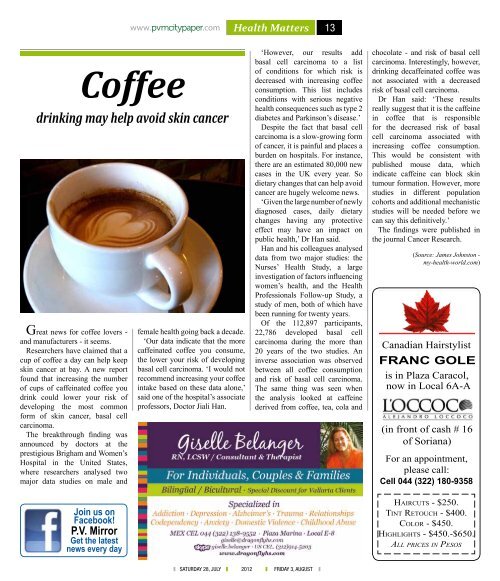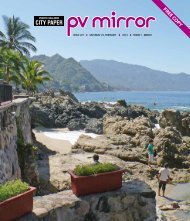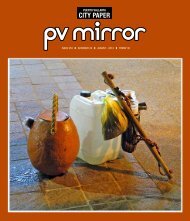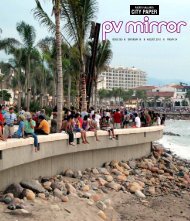saturday 28, july friday 3, august issue 197 2012 - pvmcitypaper
saturday 28, july friday 3, august issue 197 2012 - pvmcitypaper
saturday 28, july friday 3, august issue 197 2012 - pvmcitypaper
Create successful ePaper yourself
Turn your PDF publications into a flip-book with our unique Google optimized e-Paper software.
Health Matters 13<br />
Great news for coffee lovers -<br />
and manufacturers - it seems.<br />
Researchers have claimed that a<br />
cup of coffee a day can help keep<br />
skin cancer at bay. A new report<br />
found that increasing the number<br />
of cups of caffeinated coffee you<br />
drink could lower your risk of<br />
developing the most common<br />
form of skin cancer, basal cell<br />
carcinoma.<br />
The breakthrough finding was<br />
announced by doctors at the<br />
prestigious Brigham and Women’s<br />
Hospital in the United States,<br />
where researchers analysed two<br />
major data studies on male and<br />
Coffee<br />
drinking may help avoid skin cancer<br />
female health going back a decade.<br />
‘Our data indicate that the more<br />
caffeinated coffee you consume,<br />
the lower your risk of developing<br />
basal cell carcinoma. ‘I would not<br />
recommend increasing your coffee<br />
intake based on these data alone,’<br />
said one of the hospital’s associate<br />
professors, Doctor Jiali Han.<br />
‘However, our results add<br />
basal cell carcinoma to a list<br />
of conditions for which risk is<br />
decreased with increasing coffee<br />
consumption. This list includes<br />
conditions with serious negative<br />
health consequences such as type 2<br />
diabetes and Parkinson’s disease.’<br />
Despite the fact that basal cell<br />
carcinoma is a slow-growing form<br />
of cancer, it is painful and places a<br />
burden on hospitals. For instance,<br />
there are an estimated 80,000 new<br />
cases in the UK every year. So<br />
dietary changes that can help avoid<br />
cancer are hugely welcome news.<br />
‘Given the large number of newly<br />
diagnosed cases, daily dietary<br />
changes having any protective<br />
effect may have an impact on<br />
public health,’ Dr Han said.<br />
Han and his colleagues analysed<br />
data from two major studies: the<br />
Nurses’ Health Study, a large<br />
investigation of factors influencing<br />
women’s health, and the Health<br />
Professionals Follow-up Study, a<br />
study of men, both of which have<br />
been running for twenty years.<br />
Of the 112,897 participants,<br />
22,786 developed basal cell<br />
carcinoma during the more than<br />
20 years of the two studies. An<br />
inverse association was observed<br />
between all coffee consumption<br />
and risk of basal cell carcinoma.<br />
The same thing was seen when<br />
the analysis looked at caffeine<br />
derived from coffee, tea, cola and<br />
chocolate - and risk of basal cell<br />
carcinoma. Interestingly, however,<br />
drinking decaffeinated coffee was<br />
not associated with a decreased<br />
risk of basal cell carcinoma.<br />
Dr Han said: ‘These results<br />
really suggest that it is the caffeine<br />
in coffee that is responsible<br />
for the decreased risk of basal<br />
cell carcinoma associated with<br />
increasing coffee consumption.<br />
This would be consistent with<br />
published mouse data, which<br />
indicate caffeine can block skin<br />
tumour formation. However, more<br />
studies in different population<br />
cohorts and additional mechanistic<br />
studies will be needed before we<br />
can say this definitively.’<br />
The findings were published in<br />
the journal Cancer Research.<br />
(Source: James Johnston -<br />
my-health-world.com)<br />
SATURDAY <strong>28</strong>, JULY<br />
<strong>2012</strong> FRIDAY 3, AUGUST













